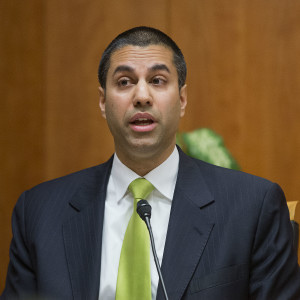Federal Communications Commissioner Ajit Pai dropped his agenda Tuesday to speed up deployment and delivery of broadband internet in America’s typically underserved rural areas, laying out a plan to encourage gigabit speeds in some of the poorest parts of the country.
The Republican commissioner outlined the major tenets of his plan during a speech at The Brandery, a Cincinnati-based startup accelerator, where he called for more center-right, market-based approaches than those typically sought by the FCC’s three-Democrat majority, including tax incentives for internet service providers (ISPs), entrepreneurs and a streamlined regulatory permitting process for wireless and broadband infrastructure.
“The concept is simple,” Pai said. “Provide financial incentives for internet service providers to deploy gigabit broadband services in low-income neighborhoods. Incentivize local governments to make it easy for ISPs to deploy these networks. And offer tax incentives for startups of all kinds in order to take advantage of these networks and create jobs in these areas.”
Pai, who hails from rural Kansas, said he’ll lead the charge by calling on Congress to “create Gigabit Opportunity Zones,” areas with average incomes below $40,243 where ISPs would qualify for federal tax incentives in exchange for building networks boasting 1,000 megabits per second download speeds, far exceeding the FCC’s minimum definition of broadband speed of 25 Mbps, and the U.S.’s average of 31 Mbps.
With those incentives, ISPs “would be able to immediately expense all capital spending associated with bringing gigabit services to residents and businesses” and “carryover any losses for up to seven years, giving new ISP competitors with less revenues a strong incentive to enter the market.”
Startups in those areas would be eligible for federal tax credits “to offset the employer-side payroll taxes for any startup employee who works in a Gigabit Opportunity Zone.” To qualify as a zone, state and local governments would have to adopt deployment-friendly policies with streamlined deployment and siting processes.
“And it will incentivize civic leaders across the country to qualify so that they can publicize the fact that their communities are open for jobs, opportunities, and economic growth,” Pai said. “Gigabit Opportunity Zones would be a powerful tool for closing the digital divide that too often separates the haves from the have-nots.”
The second part of Pai’s plan deals with increasing access to mobile broadband in the most rural regions of the U.S. lacking wired network infrastructure, where wireless is the only choice for residents. To do that, the commissioner said his own agency should change 10-year spectrum licenses requiring wireless carriers to reach 75 percent of the population to 15-year licenses with a requirement to reach 95 percent.
Without the mandate, Pai said carriers have no incentive to expand beyond the minimum. In return, they’ll get to hold onto the airwaves for another five years, justifying the expense. A “rural dividend” of 10 percent of the proceeds from future FCC auctions for spectrum licenses would go to support rural broadband deployment.
He also called for a revamp of the FCC’s Mobility Fund, which shells out $400 million from the FCC’s Universal Service Fund “each year paying two, three, or even six wireless carriers to overbuild each other and displace private investment.” Instead, he said the FCC should set minimum service requirements in order to hold recipients of the funds accountable and uncap it “to what it takes to get the job done.”
Pai said the FCC should use its congressional authority to preempt state and local laws that slow or bar the deployment of wireless and broadband infrastructure, and do so well ahead of the national rollout of 5G, which will require more dense infrastructure than any before.
To that end, he said Congress should give the FCC the power to regulate rates for pole attachments — when providers add fiber, coaxial or other wires to existing poles — make “dig once” a national policy, so that for every road built, a fiber conduit is laid accordingly, and streamline the permitting process through all federal agencies for building broadband infrastructure on federal lands.
Lastly, he stumped for representatives of the sharing economy like Uber, Airbnb and Kickstarter, increasingly facing regulatory barriers meant for the incumbent players in the industries they’re disrupting. Though many are beyond the FCC’s jurisdiction, Pai said that shouldn’t stop Congress from deregulating or reforming taxes for startups and disruptors.
“So should Uber, Lyft, and other ride-sharing companies be regulated like taxicabs? No. Should Airbnb abide by the longstanding rules of the hotel industry? No. Should Tesla have to pay middlemen (car dealers) instead of selling directly to consumers? Of course not. If municipalities are going to serve their citizens, they should embrace innovation as a consumer good, not as a threat.”

